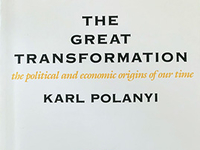When debating Ludwig von Mises on the question of socialist accountancy, Karl Polanyi made the following remark. “Accounting is a quantitative overview of economic activity. The capitalist economy, for example, revolves around profit, so its accounting provides an overview of the relationship of each element of capital to profit. An army’s activity confines itself to achieving military technical goals by expending money and goods, so its overview becomes, in some sense, an end in itself: it enables control…” The task of each particular system of accounting, he goes on, “is therefore simply the following: accounting has to offer us quantitative answers to the questions we need to pose about the economic activity at hand. The character of these questions determines the character of the accounting system that will provide answers to them. The capitalist economy, for example, makes profit its practical goal, and thus its accounting system is tasked with providing an overview that quantitatively presents the relationship of each of its characteristic elements (the different elements of capital) to the imperative of profitability.”
In this passage, Polanyi identifies the core accounting principle of the capitalist economy: it revolves around profit. He also gives the example of an army’s accounting (“it enables control”) as an example of a different type. Let us briefly explore this, beginning with the great accounting debates and transformations of the interwar period. One was the socialist accounting debate, in which Polanyi took part. The other was the revolution in national income accounting. Here, a pioneer was the US institutionalist economist Wesley Mitchell. He was critical of neoclassical theory as “qualitative” and called for an infusion of quantification into economics. Economics should be situated on measurable, and therefore solid, terrain.
The birth of national income accounting
In 1920, just prior Polanyi’s intervention in the socialist accounting debate, Mitchell set up the National Bureau of Economic Research. It aimed to collect data systematically, and to develop a rigorous statistical overview of the economy as a whole. Mitchell was among the designers of the modern concept of a national income. He fleshed it out by providing actual numbers, which purported to represent the concept. In doing so he fashioned what Philip Mirowski in his book The Birth of the Business Cycle called “a new theoretical entity.” This work set the stage for the macroeconomic revolution in economics: for Keynes’ General Theory, and also for Gross Domestic Product (GDP). In 1932, the US Congress commissioned Simon Kuznets - a student of Mitchell’s - to devise a means by which to measure the nation’s output. Kuznets’ work eventually led to Gross National Product (GNP) and GDP. The 1930s also saw the attempt by Colin Clark to statistically estimate the annual “rate of growth of real income per head,” as well as “the first dynamic model claiming to represent an entire economy” which Jan Tinbergen published in 1936.
At first, national income accounting was carried by a reformist wind. If government was to intervene effectively to ameliorate suffering during the Depression years, it needed help from statisticians. Kuznets’ initial drafts sought to develop national accounting along welfare-based lines, including “goods” but subtracting expenditures in “bads,” like armaments. But Kuznets’ and Mitchell’s preoccupation with welfarewas, as Marion Fourcade notes in Economists and Societies, brushed aside when the exigencies of war planning, and then Keynesian macroeconomics and demand management, took precedent. Kuznets himself worked on military planning at the War Production Board using the national income accounting techniques he had helped develop at the Commerce Department. In the same process, military spending - personnel salaries and arms purchases - came to be included in GDP, even as welfare payments (social security and unemployment benefits) found themselves excluded.
Problems with GDP
In essence, GDP presents a survey of economic activity from the perspective of legally-transacted exchange value. It “rewards” commodification: sing a song and GDP doesn’t rise, but sing the same song and demand that your audience buy tickets, it does. GDP excludes transactions in which no money changes hands - housework, DIY, and voluntary work. It is gender blind and class blind. It neglects income distribution. Like exchange value, it is blind to nature too. It treats the sale of natural resources as income, without making any commensurate subtraction for resource depletion. It takes no account of externalities.
GDP, then, is a metric peculiarly appropriate to a world dominated by exchange value; it is an essentially capitalistmeasure. But, equally, it is an index developed by states and used to provide an overview of the “national economy,” with an eye above all on geopolitical competition. It is an index that mirrors the nature and needs of capitalist states. These are interested not immediately in profit, but in managing societies in the interests of capital. This is why the army’s forms of statistical overview, even when involving planning, shouldn’t be counterposed to those of capitalist business.
Today, debate surrounds GDP as never before. One consequence has been the “Beyond GDP” agenda. Whether for reasons of growth skepticism or out of concern that if GDP growth remains slack governments’ performance legitimacy will suffer too, political leaders, civil servants and academics - among them Nicolas Sarkozy, Jacinda Ardern, Gus O’Donnell, Joseph Stiglitz, and Amartya Sen - are promoting alternative yardsticks.
For the Polanyian political economist David Yarrow, the Beyond GDP agenda carries the potential to destabilize the constitution of “the economy” as a unified, market-centric object. If this were to occur, it would be a welcome development. However, GDP does not define the economic system’s core goal. That goal is the competitive accumulation of capital, and the accounting principles that guide it are those at the level of the firm, not the state. If the above analysis is correct, when critiques of growthism focus solely on the GDP metric while being coy about capital, they are occluding the deeper cause.
Gareth Dale, Brunel University London, UK <Gareth.Dale@brunel.ac.uk>






















